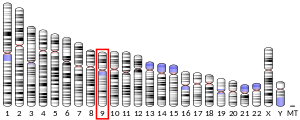Long-chain fatty acid transport protein 4 is a protein that in humans is encoded by the SLC27A4 gene. This membrane protein is also called FATP4 or ACSVL5 (very long chain fatty acyl-CoA synthetase 5). The purified protein shows enzyme activity (EC 6.2.1.3), esterifying long and very long chain fatty acids with Coenzyme A. It is debated whether it is also a fatty acid transporter at the plasma membrane.
See also
References
- ^ GRCh38: Ensembl release 89: ENSG00000167114 – Ensembl, May 2017
- ^ GRCm38: Ensembl release 89: ENSMUSG00000059316 – Ensembl, May 2017
- "Human PubMed Reference:". National Center for Biotechnology Information, U.S. National Library of Medicine.
- "Mouse PubMed Reference:". National Center for Biotechnology Information, U.S. National Library of Medicine.
- Fitscher BA, Riedel HD, Young KC, Stremmel W (Dec 1998). "Tissue distribution and cDNA cloning of a human fatty acid transport protein (hsFATP4)". Biochimica et Biophysica Acta (BBA) - Gene Structure and Expression. 1443 (3): 381–5. doi:10.1016/s0167-4781(98)00231-0. PMID 9878842.
- "Entrez Gene: SLC27A4 solute carrier family 27 (fatty acid transporter), member 4".
- Hall AM, Wiczer BM, Herrmann T, Stremmel W, Bernlohr DA (Mar 2005). "Enzymatic properties of purified murine fatty acid transport protein 4 and analysis of acyl-CoA synthetase activities in tissues from FATP4 null mice". The Journal of Biological Chemistry. 280 (12): 11948–54. doi:10.1074/jbc.M412629200. PMID 15653672.
- Watkins PA (Jan 2008). "Very-long-chain acyl-CoA synthetases". The Journal of Biological Chemistry. 283 (4): 1773–7. doi:10.1074/jbc.R700037200. PMID 18024425.
Further reading
- Hirsch D, Stahl A, Lodish HF (Jul 1998). "A family of fatty acid transporters conserved from mycobacterium to man". Proceedings of the National Academy of Sciences of the United States of America. 95 (15): 8625–9. Bibcode:1998PNAS...95.8625H. doi:10.1073/pnas.95.15.8625. PMC 21126. PMID 9671728.
- Stahl A, Hirsch DJ, Gimeno RE, Punreddy S, Ge P, Watson N, Patel S, Kotler M, Raimondi A, Tartaglia LA, Lodish HF (Sep 1999). "Identification of the major intestinal fatty acid transport protein". Molecular Cell. 4 (3): 299–308. doi:10.1016/S1097-2765(00)80332-9. PMID 10518211.
- Gertow K, Bellanda M, Eriksson P, Boquist S, Hamsten A, Sunnerhagen M, Fisher RM (Jan 2004). "Genetic and structural evaluation of fatty acid transport protein-4 in relation to markers of the insulin resistance syndrome". The Journal of Clinical Endocrinology and Metabolism. 89 (1): 392–9. doi:10.1210/jc.2003-030682. hdl:11577/1331563. PMID 14715877.
- Gertow K, Pietiläinen KH, Yki-Järvinen H, Kaprio J, Rissanen A, Eriksson P, Hamsten A, Fisher RM (Jun 2004). "Expression of fatty-acid-handling proteins in human adipose tissue in relation to obesity and insulin resistance". Diabetologia. 47 (6): 1118–25. doi:10.1007/s00125-004-1417-4. PMID 15168018.
- Ewing RM, Chu P, Elisma F, Li H, Taylor P, Climie S, McBroom-Cerajewski L, Robinson MD, O'Connor L, Li M, Taylor R, Dharsee M, Ho Y, Heilbut A, Moore L, Zhang S, Ornatsky O, Bukhman YV, Ethier M, Sheng Y, Vasilescu J, Abu-Farha M, Lambert JP, Duewel HS, Stewart II, Kuehl B, Hogue K, Colwill K, Gladwish K, Muskat B, Kinach R, Adams SL, Moran MF, Morin GB, Topaloglou T, Figeys D (2007). "Large-scale mapping of human protein-protein interactions by mass spectrometry". Molecular Systems Biology. 3 (1): 89. doi:10.1038/msb4100134. PMC 1847948. PMID 17353931.
- Milger K, Herrmann T, Becker C, Gotthardt D, Zickwolf J, Ehehalt R, Watkins PA, Stremmel W, Füllekrug J (Nov 2006). "Cellular uptake of fatty acids driven by the ER-localized acyl-CoA synthetase FATP4". Journal of Cell Science. 119 (Pt 22): 4678–88. doi:10.1242/jcs.03280. PMID 17062637.
| Membrane proteins, carrier proteins: membrane transport proteins solute carrier (TC 2A) | |||||||||||||||||||||||||||||||||||||||||||||||||||||||||||||||||||||||||||||||||||||||||||||||||||||||||||||||||||||||||||||||||||||||||
|---|---|---|---|---|---|---|---|---|---|---|---|---|---|---|---|---|---|---|---|---|---|---|---|---|---|---|---|---|---|---|---|---|---|---|---|---|---|---|---|---|---|---|---|---|---|---|---|---|---|---|---|---|---|---|---|---|---|---|---|---|---|---|---|---|---|---|---|---|---|---|---|---|---|---|---|---|---|---|---|---|---|---|---|---|---|---|---|---|---|---|---|---|---|---|---|---|---|---|---|---|---|---|---|---|---|---|---|---|---|---|---|---|---|---|---|---|---|---|---|---|---|---|---|---|---|---|---|---|---|---|---|---|---|---|---|---|---|
| |||||||||||||||||||||||||||||||||||||||||||||||||||||||||||||||||||||||||||||||||||||||||||||||||||||||||||||||||||||||||||||||||||||||||
| |||||||||||||||||||||||||||||||||||||||||||||||||||||||||||||||||||||||||||||||||||||||||||||||||||||||||||||||||||||||||||||||||||||||||
| see also solute carrier disorders | |||||||||||||||||||||||||||||||||||||||||||||||||||||||||||||||||||||||||||||||||||||||||||||||||||||||||||||||||||||||||||||||||||||||||
This membrane protein–related article is a stub. You can help Misplaced Pages by expanding it. |



